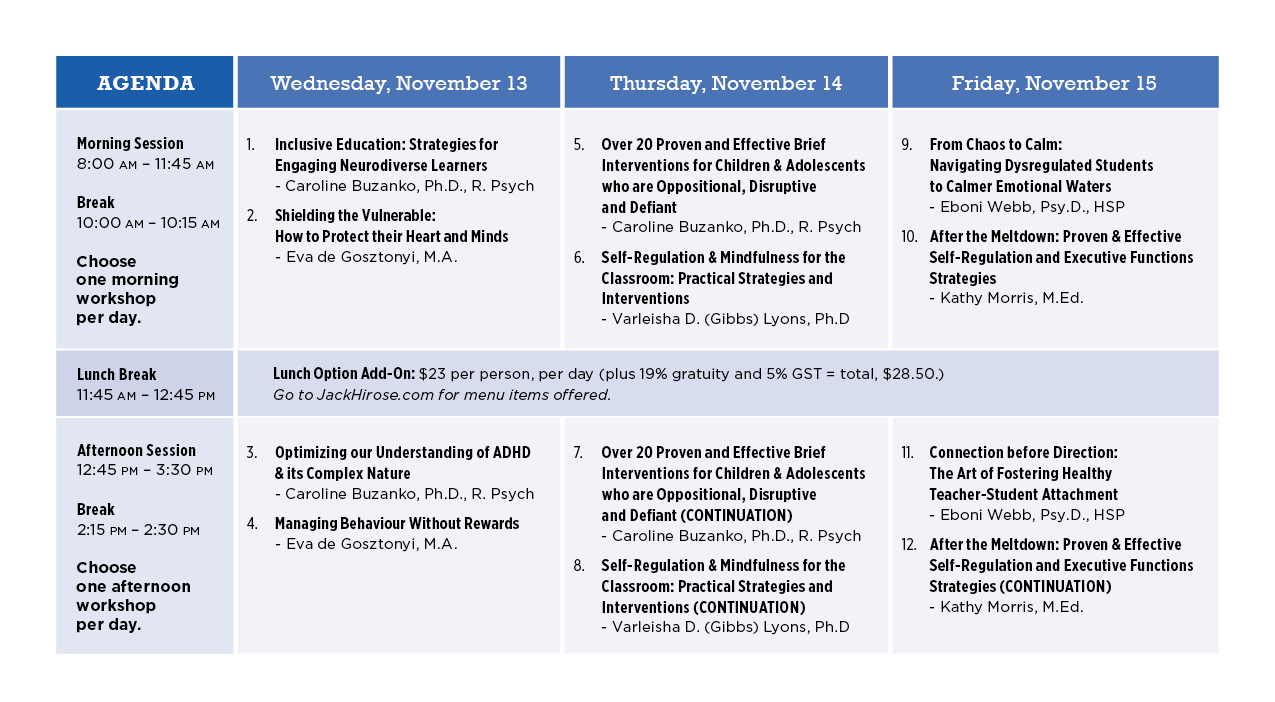 Important Notice:
Important Notice:
Online registration is now CLOSED for this conference. You can arrive up to one hour early to register at the door.
Presented by Caroline Buzanko, Ph.D., R. Psych and Eva de Gosztonyi, M.A. and Varleisha D. Lyons, Ph.D, OTD, OTR/L and Eboni Webb, Psy.D., HSP and Kathy Morris, M.Ed.
Wednesday, November 13, 2024 – Friday, November 15, 2024 | Calgary, ab
Online registration is now CLOSED for this conference. You can arrive up to one hour early to register at the door.
Wednesday, November 13, 2024 – Friday, November 15, 2024
8:00am – 3:30pm
Best Western Premier Calgary Plaza Hotel & Conference Centre
1316 33 St NE, T2A 6B6, Calgary, AB
phone: 403.248.8888
website: www.calgaryplaza.com/
Registration on this page is for live in-person attendance only. To attend virtually please register here: https://webinars.jackhirose.com/product/calgary-educators/
Live In-Person Conference
Please note, in-person registration does not include access to the live stream or recorded footage.
Live Stream from Home

Limited quantities are available. Must pre-buy during registration, not available at the door. Individuals with strict dietary needs or preferences can pre-order lunch off the menu through the hotel restaurant. Lunch buffets are non-refundable, no refund or credit will be granted under any circumstance.
Education and Clinical Professionals: All education and mental health or healthcare professionals who work with children or youth including, but not limited to K–12 Classroom Teachers, School Counsellors, Learning Assistance/Resource Teachers, School Administrators, School Paraprofessionals including Special Education Assistants, Classroom Assistants and Childcare Workers • All other professionals who support behavioural challenges and complex learning needs including but not limited to: Nurses, Social Workers, Psychologists, Clinical Counsellors, Family Therapists, Occupational Therapists, Speech Language Pathologists, Addiction Counsellors, Youth Workers, Mental Health Workers, Probation Officers and Community Police Officers.

8:00am - 11:45am November 13, 2024
COURSE DESCRIPTION
Unlock the full potential of every student by embracing neurodiversity in your classroom.
This dynamic workshop dives deep into the intricacies of neurodivergence, with a special focus on ADHD and autism, to unveil the unique strengths and challenges these learners bring to educational environments. Through a blend of engaging discussions, enlightening case studies, and practical exercises, you will learn how to create a classroom culture that recognizes and celebrates each student’s distinct contributions.
By the end of this training, you will have the tools to support all students effectively, enhancing educational outcomes across the board. Discover strategies to optimize learning and creating an inclusive space that encourages success for every learner.
LEARNING OBJECTIVES

Caroline Buzanko, Ph.D., R. Psych, is a psychologist. Mother. Professor. International Speaker. Yoda of Anxiety. ADHD Superhero. And Changer of Lives. With nearly three decades of experience, she is a recognized expert in resilience and the social, emotional, and behavioural well-being…
8:00am - 11:45am November 13, 2024
COURSE DESCRIPTION
For those who spend their days interacting with the young, be it in schools, group homes, daycares and in our own homes, we sometimes forget how vulnerable they are. Developing beings are entirely dependent on the care of the more mature. Yet so many common practices that we use, especially when behaviour is challenging, increase feelings of separation and vulnerability and inadvertently lead to other unanticipated problems, including mental-health issues. This session will focus on creating a better understanding of what our children need from us and on analyzing the pitfalls of some of our most commonly used interventions and interactions, including the use of praise, rewards, consequences, time-outs, democratic or child-led practices, and self-regulation. The presentation will then provide alternatives to these, as well as encouraging adults to find ways to support children in the most important task of all, helping their emotions to move through.
LEARNING OBJECTIVES

Eva de Gosztonyi, MA, is a psychologist who has worked for over 45 years in schools across Canada. For 22 years she was the Coordinator of the Centre of Excellence for Behaviour Management, a support to the ten English School…
More information: https://neufeldinstitute.org/person/eva-de-gosztonyi/
12:45pm - 3:30pm November 13, 2024
COURSE DESCRIPTION
Attention deficit/hyperactivity disorder (ADHD) is a complex, heterogeneous disorder. When left unmanaged, ADHD is associated with long-term pervasive impairment across all areas of functioning. Recent models of ADHD have conceptualized ADHD as a disorder of behavioural inhibition, impairing executive functioning (EF), which lead to difficulties with self-regulation, organizing and planning behaviours, attention, and distractibility.
Given the substantial risk for students with ADHD, conducting valid and collaborative assessments, as well as developing effective interventions to promote student success, are critical to mitigate associated impairments and long-term risks. In this learning series, clinicians, educators, and families will develop a 360° understanding of ADHD to promote student success in all areas of functioning. Participants will learn more about the ADHD brain, how EF deficits manifest, self-regulation, effective teaching practices, and practical strategies to optimize the ADHD brain and the child’s overall social, emotional, and behavioural functioning. Practical case-base material is presented so participants can easily adapt strategies to meet the unique needs of their students.
Importantly, there are essential components to optimize assessments and interventions that are not widely known. This webinar is therefore vital for anyone working with children with ADHD. Participants will learn the critical steps to take to address the shortcomings of diagnostic assessments. Further, participants will learn imperative approaches to overcome the gaps that medications and behaviour modification cannot address.
When managed effectively, ADHD is an asset that supports individuals’ successes. There are so many positive qualities of ADHD that need to be celebrated, which are also addressed. By the end of the webinar, participants will have a renewed outlook on ADHD, and they will be better equipped to identify ADHD and design and implement effective intervention programs for children with ADHD.
LEARNING OBJECTIVES
12:45pm - 3:30pm November 13, 2024
COURSE DESCRIPTION
When students have difficulty with their behaviours teachers are often advised to implement a reward system. However, developmental science and trauma research do not support these systems, warning of unwanted side-effects for children’s development. These systems are known to lose their effectiveness over time, are complicated to implement, and rarely result in long-term change. Of concern is that they can significantly affect the all-important child-adult attachment relationship, can increase anxiety even among the well-behaved, and can cause discouragement and a sense of shame for the student who cannot “do better” despite best intentions and a desire to earn rewards. This presentation will provide an analysis of what works and does not work, and why. Then effective alternatives to help manage behaviour in the classroom such as increasing the students’ desire to please their teacher, simple classroom alterations that can make behaving appropriately easier, and suggestions for how to respond when behaviour is challenging, will be described.
LEARNING OBJECTIVES
8:00am - 11:45am November 14, 2024
COURSE DESCRIPTION
In today’s complex world, most children and adolescents experience ups and downs and engage in challenging behaviours from time to time. However, these behavioural become problematic when they occur frequently and begin to impair daily functioning. The prevalence of emotional and behavioural issues in young individuals has surged, often without adequate support, leading to potential long-term consequences for their well-being and development.
Early intervention and treatment are crucial to support the social, emotional, and behavioural wellbeing of children and adolescents and reduce future risks. However, many are unsure how to provide effective help, particularly in the heat of the moment.
Are you ready to make a profound difference in the lives of children and adolescents facing intense behavioural challenges? This dynamic workshop is a must for anyone seeking effective strategies to understand, prevent, and respond to oppositional, defiant, and disruptive behaviours.
Equip yourself with the knowledge and skills needed to transform challenging behaviours into opportunities for growth and success. Establish a solid foundation for addressing these behaviours effectively with practical strategies and interventions. Even more importantly, learn how to guide children and adolescents toward positive choices while promoting their resilience and emotional well-being.
Don’t miss this opportunity to make a positive impact on the lives of children and adolescents facing oppositional, defiant, and disruptive challenges. Join us for this comprehensive workshop and be the change they need.
LEARNING OBJECTIVES
8:00am - 11:45am November 14, 2024
COURSE DESCRIPTION
Embark on an illuminating journey with sought-after occupational therapist Dr. Varleisha (Gibbs) Lyons, PhD, OTD, OTR/L, ASDCS, FAOTA, as she guides you through a transformative six-hour workshop experience. Dr. Lyons will delve into the foundations of selecting appropriate interventions for students exhibiting challenging behaviors, including hyperactivity, aggressiveness, self-stimulatory behaviors, and inattentiveness, among others.
In this workshop, participants will be ignited by the revelations uncovered in Dr. Lyons’ evidence-based presentation. Through a simplistic yet profound exploration, attendees will gain a deep understanding of the connection between neuroscience and classroom performance, particularly in terms of self-regulation and sensory processing.
Additionally, participants will be introduced to the Classroom Self-Regulation and Mindfulness program, a cutting-edge approach designed to empower educators and therapists in fostering self-regulation skills among students.
Throughout this immersive workshop, attendees will navigate the intricacies of neurobiology and its intersection with various sensory strategies, techniques, and equipment used when working with children facing challenges with self-regulation. Diagnoses such as sensory processing disorder, trauma, autism, and ADHD will be addressed, with treatment techniques including mindfulness, social skill programs, music and movement, and respiratory-based approaches thoroughly analyzed.
Join Dr. Varleisha (Gibbs) Lyons on this enlightening journey as we unlock the keys to promoting self-regulation and sensory processing in the classroom, leaving equipped with invaluable insights and actionable strategies for transformative change.
LEARNING OBJECTIVES

Varleisha D. Lyons Ph.D, OTD, OTR/L is a renowned occupational therapist, author, and speaker who is deeply passionate about promoting culturally intelligent and spiritually centered mental health care. As a woman of African American and Native American heritage, with ancestral ties…
More information: www.drvgibbs.com
12:45pm - 3:30pm November 14, 2024
COURSE DESCRIPTION
In today’s complex world, most children and adolescents experience ups and downs and engage in challenging behaviours from time to time. However, these behavioural become problematic when they occur frequently and begin to impair daily functioning. The prevalence of emotional and behavioural issues in young individuals has surged, often without adequate support, leading to potential long-term consequences for their well-being and development.
Early intervention and treatment are crucial to support the social, emotional, and behavioural wellbeing of children and adolescents and reduce future risks. However, many are unsure how to provide effective help, particularly in the heat of the moment.
Are you ready to make a profound difference in the lives of children and adolescents facing intense behavioural challenges? This dynamic workshop is a must for anyone seeking effective strategies to understand, prevent, and respond to oppositional, defiant, and disruptive behaviours.
Equip yourself with the knowledge and skills needed to transform challenging behaviours into opportunities for growth and success. Establish a solid foundation for addressing these behaviours effectively with practical strategies and interventions. Even more importantly, learn how to guide children and adolescents toward positive choices while promoting their resilience and emotional well-being.
Don’t miss this opportunity to make a positive impact on the lives of children and adolescents facing oppositional, defiant, and disruptive challenges. Join us for this comprehensive workshop and be the change they need.
LEARNING OBJECTIVES
12:45pm - 3:30pm November 14, 2024
COURSE DESCRIPTION
Embark on an illuminating journey with sought-after occupational therapist Dr. Varleisha (Gibbs) Lyons, PhD, OTD, OTR/L, ASDCS, FAOTA, as she guides you through a transformative six-hour workshop experience. Dr. Lyons will delve into the foundations of selecting appropriate interventions for students exhibiting challenging behaviors, including hyperactivity, aggressiveness, self-stimulatory behaviors, and inattentiveness, among others.
In this workshop, participants will be ignited by the revelations uncovered in Dr. Lyons’ evidence-based presentation. Through a simplistic yet profound exploration, attendees will gain a deep understanding of the connection between neuroscience and classroom performance, particularly in terms of self-regulation and sensory processing.
Additionally, participants will be introduced to the Classroom Self-Regulation and Mindfulness program, a cutting-edge approach designed to empower educators and therapists in fostering self-regulation skills among students.
Throughout this immersive workshop, attendees will navigate the intricacies of neurobiology and its intersection with various sensory strategies, techniques, and equipment used when working with children facing challenges with self-regulation. Diagnoses such as sensory processing disorder, trauma, autism, and ADHD will be addressed, with treatment techniques including mindfulness, social skill programs, music and movement, and respiratory-based approaches thoroughly analyzed.
Join Dr. Varleisha (Gibbs) Lyons on this enlightening journey as we unlock the keys to promoting self-regulation and sensory processing in the classroom, leaving equipped with invaluable insights and actionable strategies for transformative change.
LEARNING OBJECTIVES
8:00am - 11:45am November 15, 2024
COURSE DESCRIPTION
This engaging and insightful session is designed for educators, school psychologists, counselors, and other professionals who encounter highly dysregulated students in educational settings. The course provides a deep dive into understanding emotional dysregulation in students, its underlying causes, and its impact on learning and behavior. Participants will explore evidence-based strategies and interventions to effectively support and manage dysregulated students, fostering a more inclusive and productive learning environment.
Through interactive discussions, case studies, and role-playing exercises, this session will equip attendees with the tools and understanding necessary to address the challenges posed by emotional dysregulation in the classroom, promoting positive educational outcomes for all students.

Eboni Webb, PsyD, HSP, earned her Doctorate in Clinical Psychology from the Minnesota School of Professional Psychology (MSPP). She began her clinical work as assistant clinical director and program director at Mental Health Systems, PC (MHS), one of the largest providers…
8:00am - 11:45am November 15, 2024
COURSE DESCRIPTION
This 6-hour course offers comprehensive training for professionals and caregivers working with children or adolescents diagnosed with Autism Spectrum Disorder (ASD), Attention-Deficit/Hyperactivity Disorder (ADHD), or other developmental disorders. Participants will learn practical strategies to manage meltdowns, tantrums, and challenging behaviors resulting from sensory overload and emotional dysregulation. The course emphasizes fostering positive behavior, enhancing self-regulation skills, and improving overall quality of life for individuals with neurodevelopmental differences.
LEARNING OBJECTIVES

Kathy Morris, M.Ed., has been a speech therapist, teacher for self-contained programs (including students with autism, severe behavioural difficulties, and cerebral palsy), resource teacher and first grade teacher. She was also a diagnostician/supervisor for all grade levels. She was a LIFE…
12:45pm - 3:30pm November 15, 2024
COURSE DESCRIPTION
In this dynamic and interactive session, participants will explore the critical role of attachment in the educational setting and its impact on both student development and teacher well-being. This course delves into the psychological principles of attachment theory, emphasizing practical strategies for fostering healthy, secure attachments between teachers and students. Participants will engage in evidence-based discussions, case studies, and experiential learning activities designed to enhance their understanding and application of attachment principles in the classroom. Through this session, educators, counselors, and school administrators will gain insights into creating a supportive and nurturing learning environment that promotes positive educational outcomes and emotional well-being for all students.
LEARNING OBJECTIVES
12:45pm - 3:30pm November 15, 2024
COURSE DESCRIPTION
This 6-hour course offers comprehensive training for professionals and caregivers working with children or adolescents diagnosed with Autism Spectrum Disorder (ASD), Attention-Deficit/Hyperactivity Disorder (ADHD), or other developmental disorders. Participants will learn practical strategies to manage meltdowns, tantrums, and challenging behaviors resulting from sensory overload and emotional dysregulation. The course emphasizes fostering positive behavior, enhancing self-regulation skills, and improving overall quality of life for individuals with neurodevelopmental differences.
LEARNING OBJECTIVES
| Registration | Super Early Bird Fee | Early Bird Fee | Regular Fee |
|---|---|---|---|
| Individual 1 Day Enrollment | -- | $289.00 | $309.00 |
| Individual 2 Day Enrollment | -- | $489.00 | $509.00 |
| Individual 3 Day Enrollment | -- | $699.00 | $719.00 |
| Group 3-7 | -- | $659.00 | $679.00 |
| Group 8-14 | -- | $639.00 | $659.00 |
| Group 15+ | -- | $619.00 | $639.00 |
| Full-Time Student | -- | $619.00 | $639.00 |
All fees are per person and in Canadian Dollars ($CAD)
Fees do not include applicable taxes (5% GST).
Early bird cutoff date: October 30, 2024
The early bird date has passed. Regular rates apply.
Please review our Registration Terms and Conditions for information on our cancellation policy, payment policies, rebates, and more. You must agree to our Terms and Conditions to register for a workshop or conference.
All brochures and forms are provided in .PDF format.
If you are unable to open our files, we recommend downloading Adobe Reader for free.
1316 33 St NE, T2A 6B6, Calgary, AB
phone: 403.248.8888
website: www.calgaryplaza.com/
Our rates:
Call: Please contact the hotel directly for current group rates, when booking please reference “Jack Hirose & Associates“. To make a reservation over the phone, please call 403.248.8888.
Select King Room: $139.00 plus tax
Select 2 Queen Room: $139.00 plus tax
*please note, room reservations are subject to availability*
Please keep in mind when booking Jack Hirose and Associates corporate guest rooms, reservations booked for most hotels can be cancelled within 48 hours. If you are booking guest rooms through third-party websites in many instances the reservations booked cannot be cancelled.
Jack Hirose & Associates is approved by the Canadian Psychological Association to offer continuing education for psychologists. Jack Hirose & Associates maintains responsibility for the program.
† The Alberta College of Social Workers (ACSW) and the Newfoundland and Labrador Association of Social Workers (NLASW) accept CPA-approved CEUs.
* Participants will receive a certificate of completion after every workshop. Workshops are pre-approved for 5.5 or 6 credits per day unless otherwise specified.
Please check back closer to the conference date for more information.
There are no related events at this time.